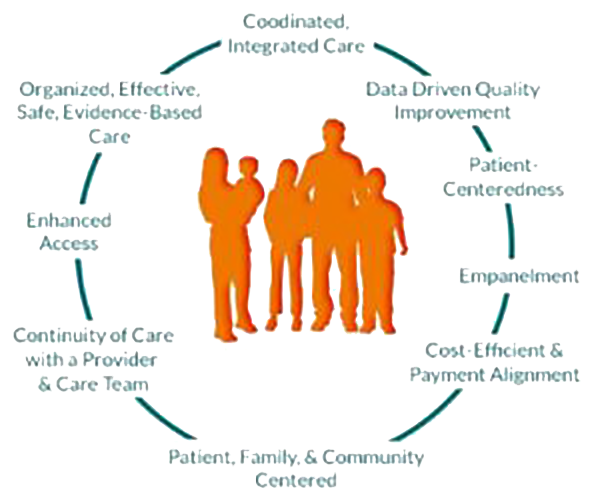FHCC Health Home
FHCC PATIENT-CENTERED MEDICAL HOME
What is a Patient-Centered Medical Home?
When it comes to your health, you want to feel well and be well cared for, whether recovering from an illness or managing a chronic condition such as diabetes or asthma, or just having a check-up. Life is a cycle of staying well, getting well, and feeling well. If you deal with these health situations in a long-term relationship with a trusted healthcare team, then you’ve found your FHCC Patient-Center Medical Home.
Our health team wants to build a relationship in which they come to know you, your family, and your health issues to provide you with the best possible care. In turn, they want you to trust and rely on them for evidence-based healthcare answers that are suited entirely to you and your family, enabling you and the Health Home Team to become partners in your wellness. Caring about you and your family is the most important job of your FHCC Patient-Center Medical Home.
Who Is The PCMH Team?
Your team may include a doctor, a mid-level provider (physician assistant or nurse practitioner), a medical assistant, a health educator, a behavioral health professional, a dietitian, and other health professionals such as a care coordinator or “patient navigator” to help you find your way through the health system. They will help you get healthy, stay healthy, and get the care and services that are right for you. They will assist you with self-management tools and educational materials. You will be an active participant in all aspects of your care, including the ability to choose your primary care provider who is supported by the Health Home Team. When needed, your Health Home Team arranges for appropriate care with other qualified clinicians and settings such as referrals, consultations, x-rays, and hospitalizations.
Patient-Centered Medical Home Advantage

When You Have a PCMH, There Are Many Benefits
- Comprehensive care means your Health Home helps you address any health issue at any point in your life.
- Coordination of care occurs when any combination of services you and your provider team decide you need are coordinated and ordered in a caring and efficient way.
- Continuous care occurs over time and you can expect accurate, effective, and timely communication about the services you want or need.
- Accessible care allows you to communicate any health issue with a provider or other team member through your desired method (office visit, phone call, email, or internet portal).
- Health maintenance means you and your provider will build a care plan to address your health goals to keep you healthy and be available for you when you get sick.
- Studies have shown that people who belong to a Patient-Centered Health Home have better health outcomes and are more satisfied with the care they receive than patients who do not.
